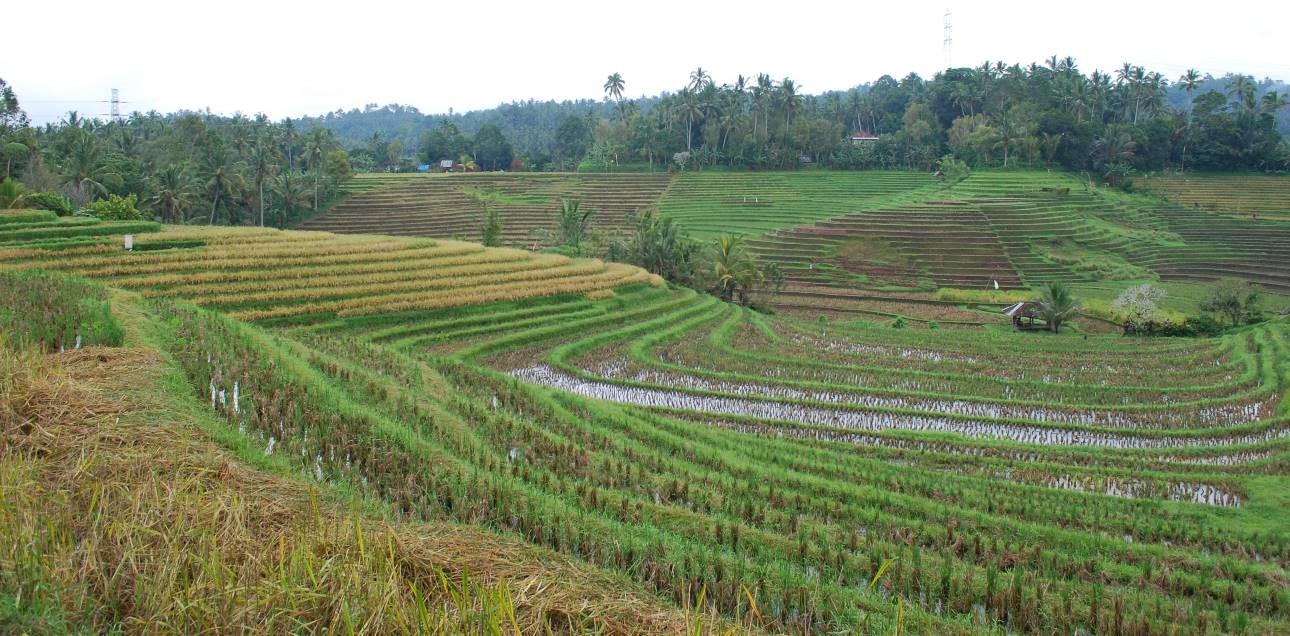 Wide agricultural land is a key attraction of the Tabanan Regency. Photo: NSLIC/NSELRED
Wide agricultural land is a key attraction of the Tabanan Regency. Photo: NSLIC/NSELRED
To the west of Denpasar City, Bali, beautiful hills and lush green of stretches of rice fields are the main attraction of villages in the Tabanan Regency. Of the 133 villages in this Regency, five villages in West Tabanan namely Belimbing Village, Sanda Village, Munduktemu Village, Wanagiri Village, and Lumbung Kauh Village, were selected as National Priority Rural Areas (KPPN) in accordance with the 2015-2019 RPJMN, which aims to reduce the number of underdeveloped villages and increase independence between villages.
The local government of Tabanan believes that these five villages can develop their priority local commodities, and their commitment to improve the welfare of Tabanan people has brought good results. In 2018, the Tabanan Regency was selected as one of the six districts/municipalities to receive support from the Responsive Innovation Fund (RIF) program. Through the RIF program, the innovation of NIKOSAKE was created to bring positive impact, new skills, jobs and livelihoods for the Tabanan people through developing these local commodities and creating new market opportunities for these local products.
THE INNOVATION OF NIKOSAKE AREA
NIKOSAKE is an acronym for Nira (neera or palm nectar), Kopi (coffee), Salak (snake fruit), and Kelapa (coconut) as the priority commodities of the five villages in West Tabanan. The derivative products from these commodities are also integrated with local tourism activities. For instance, Wanagiri Village which bears the nickname Rain Forest Village is known as ‘salak’ and a coconut producing area and Sanda Village is known as the ‘Ancient Village’ producing good quality of coffee. Therefore, NIKOSAKE has the theme “Integrated Agribusiness Development Based on Local Wisdom and Tourism”.
During the first year of implementation, the local government of Tabanan led by the Tabanan Planning and Research Office (BAPPELITBANG) collaborated intensively with the RIF program team. Various activities were held involving collaboration with vendors and local marketing aggregators such as village owned enterprises/joint village owned enterprises, known as BUMDES/BUMDESMA, and Tabanan Regency Owned Enterprise (BUMDA Tabanan) in order to improve the quality and productivity of these priority commodities.1
Specifically, regarding the BUMDA Tabanan, efforts were focused on improving the institutional and human resource capacity of the organization so they can act as a NIKOSAKE marketing aggregator. The results of this capacity building including collaboration between BUMDA Tabanan and Indomaret (convenience store chains) in the marketing of “Salak Madu” and “Salak Gula Pasir”. The Salak and Coffee Farmer Groups in NIKOSAKE provides stocks of processed salak chips and Pupuan ground coffee that were marketed in 395 Indomaret outlets throughout Bali. Armed with the knowledge and skills of business and management provided by RIF, BUMDA has expanded their businesses to a larger scale, especially during the COVID19 pandemic.
THE TECHNICAL SUPPORT OF RIF TO STRENGTHEN NIKOSAKE
The RIF program provides technical assistance to develop processed agricultural products through research, training and development. In Tabanan, Nira was processed into palm sugar and powdered palm sugar; coffee commodities into roasted, ground and brewed coffee; salak was processed into jam and chips; and coconut was processed into virgin coconut oil (VCO) and flour. To escalate the marketing of derivative products, RIF supported the MSMEs by providing quality assurance and product standardization, products certification, and a study for Patent Certification / Geographical Indication (GI) of Salak Madu and Salak Gula Pasir, which was conducted in collaboration with the Agriculture Technology Research Body (BPTP).
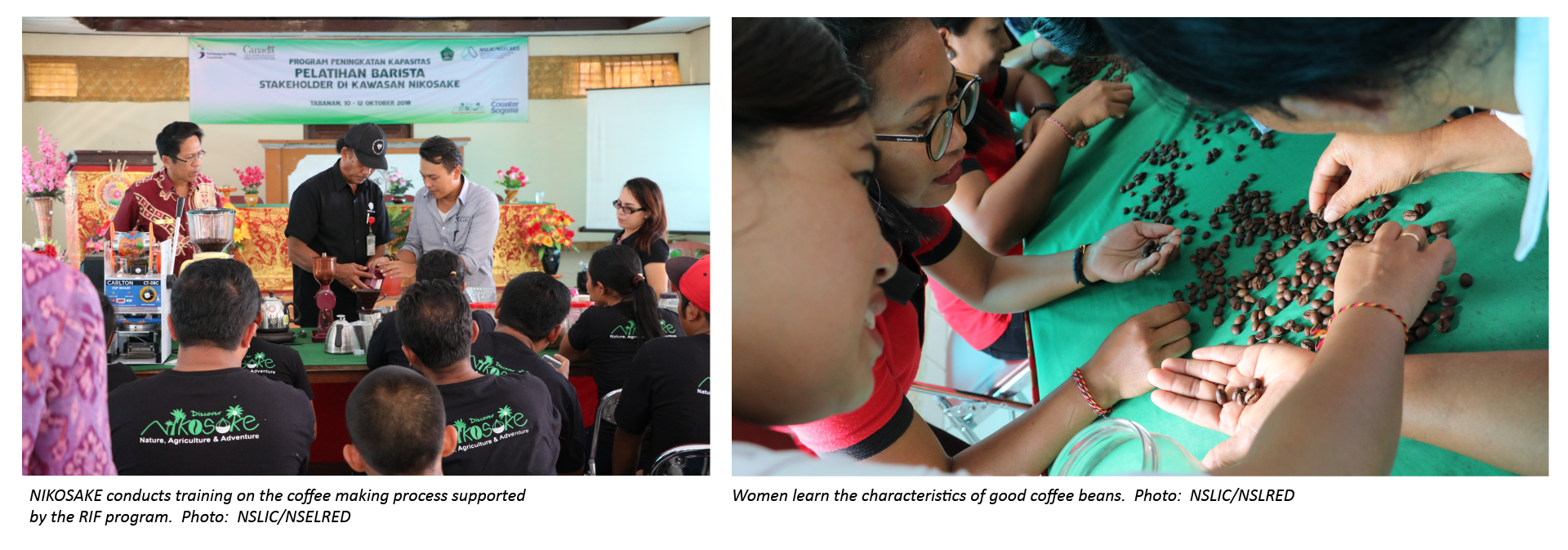
The economic empowerment of women is a key focus of RIF, and in Tabanan, the project team worked closely with the Srikandi Women’s Farmer Group in Sanda Village to develop their management capacity and to support the value addition of local commodities. Before receiving support from RIF, the coffee beans harvested by this group were only sold directly to collectors. After the technical assistance from RIF, they began to process ground coffee with an initial production of 200 kg of coffee per month.
In the tourism sector, the Tabanan Local Government including the Local Parliament supported by RIF has developed a regional master plan for the NIKOSAKE Area and formed a Tourism Awareness Group (Kelompok Sadar Wisata or Pokdarwis) managed by the local women that is part of the project emphasis on ensuring the sustainability of this initative. NIKOSAKE also collaborated with local stakeholders to develop several initiatives including the Agribusiness Tourism Market, a Green Open Space Festival, and business networking activities. In addition, the Local Guide Belimbing Village was able to increase the number of tour guides by an additional 30 people after receiving training from RIF, which is also an important part of encouraging and promoting tourism in the area.
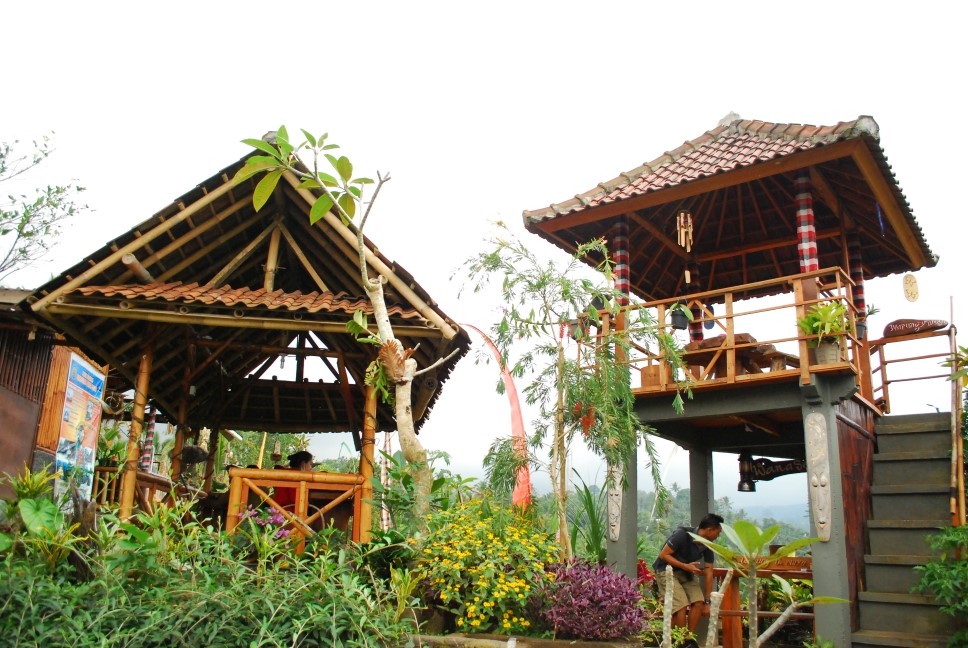 Moyo Stall owned by Sudayana Giri (33) in Belimbing village, Pupuan sub-district. Photo: NSLIC/NSELRED
Moyo Stall owned by Sudayana Giri (33) in Belimbing village, Pupuan sub-district. Photo: NSLIC/NSELRED
Product marketing and certification was also supported by RIF as a key strategy to improve market access, and after conducting coaching on the business licensing process through the Online Single Submission (OSS) system, seventeen products received a Home Industry Food Certification (Pangan Industri Rumah Tangga or PIRT) for environmentally friendly processed products. The RIF program also facilitated cross-ministry / agency cooperation, providing assistance in the use of social media and e-marketing through the Bumdesmart online shop.
“Our village is growing rapidly and independently. All these efforts have been proven to improve the economy of people and have increased public awareness of a healthy lifestyle. We will continue to do all these good efforts.” – I Ketut Sunartha, Head of Sanda Village.
SUSTAINABILITY: REGIONAL OWNED ENTERPRISES OF DHARMA SANTHIKA
As mentioned previously, RIF provided capacity building for the Tabanan Regency Owned Enterprises (BUMDA) Dharma Santhika Tabanan, and the local government of Tabanan later appointed Dharma Santhika to manage 133 villages in Tabanan including NIKOSAKE. Through this regional approach, NIKOSAKE expects that regional activities can be more effective, transparent, and professional.
Although the RIF program was concluded in 2019, PUD Dharma Santhika continues to manage and market the agricultural products of NIKOSAKE through online shops, social media, and collaborates with various hotels, shops, minimarts and supermarkets in Bali.
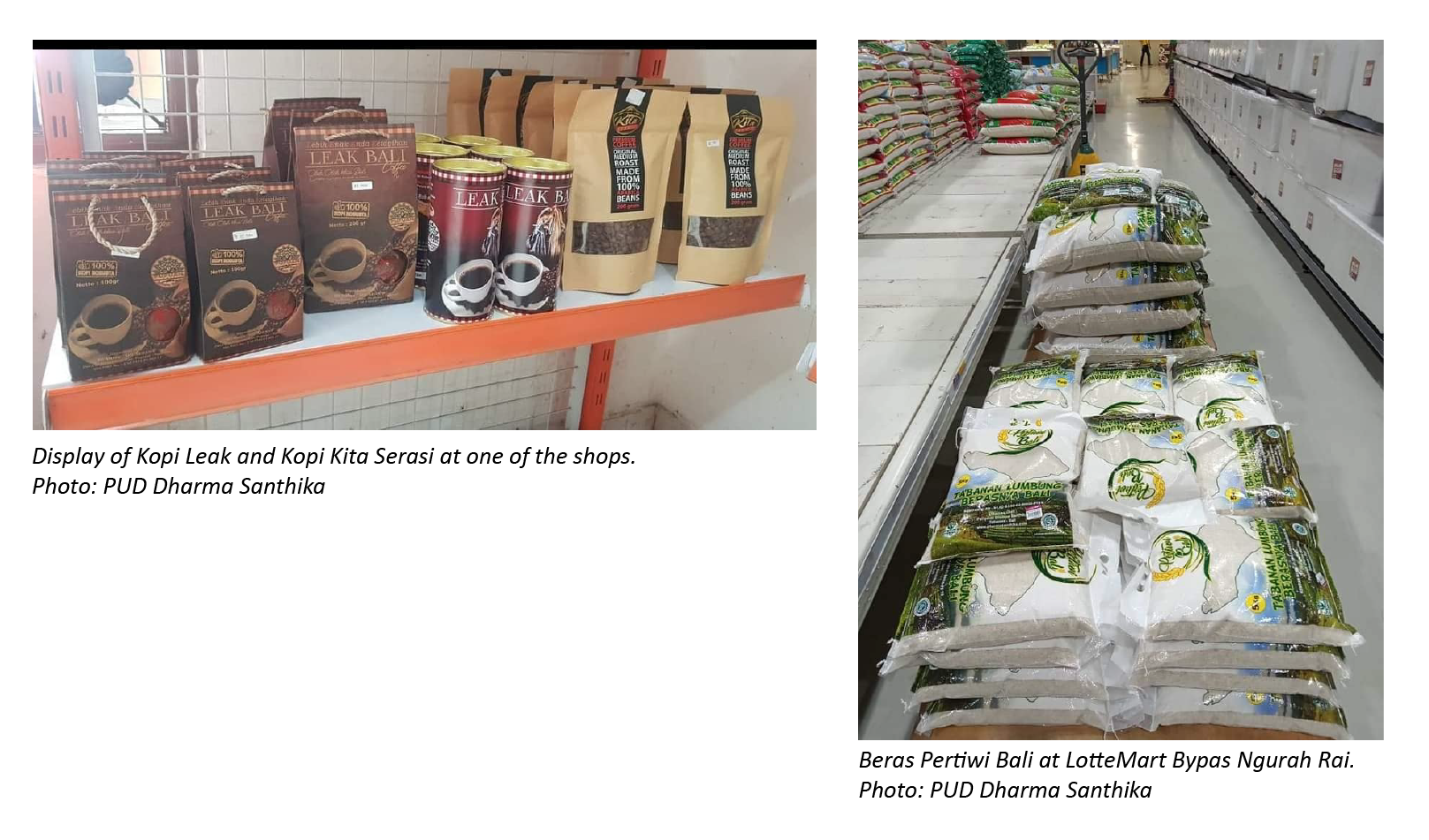
During the COVID-19 pandemic, PUD Dharma Santhika continues to innovate by producing face masks and providing cheap internet access to the local people through D’Sant Digital. PUD Dharma Santhika hopes that the success of NIKOSAKE can be replicated to other villages in Tabanan, and that the products of NIKOSAKE can enter national and international markets.
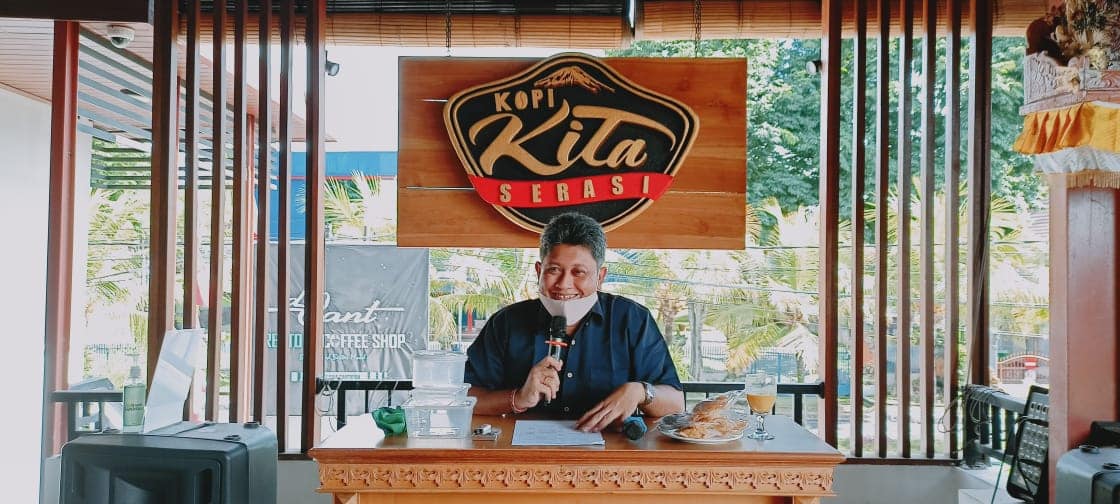 I Putu Sugi Darmawan chaired the meeting at D’Sant Resto and Coffee Shop. Photo: PUD Dharma Santhika
I Putu Sugi Darmawan chaired the meeting at D’Sant Resto and Coffee Shop. Photo: PUD Dharma Santhika
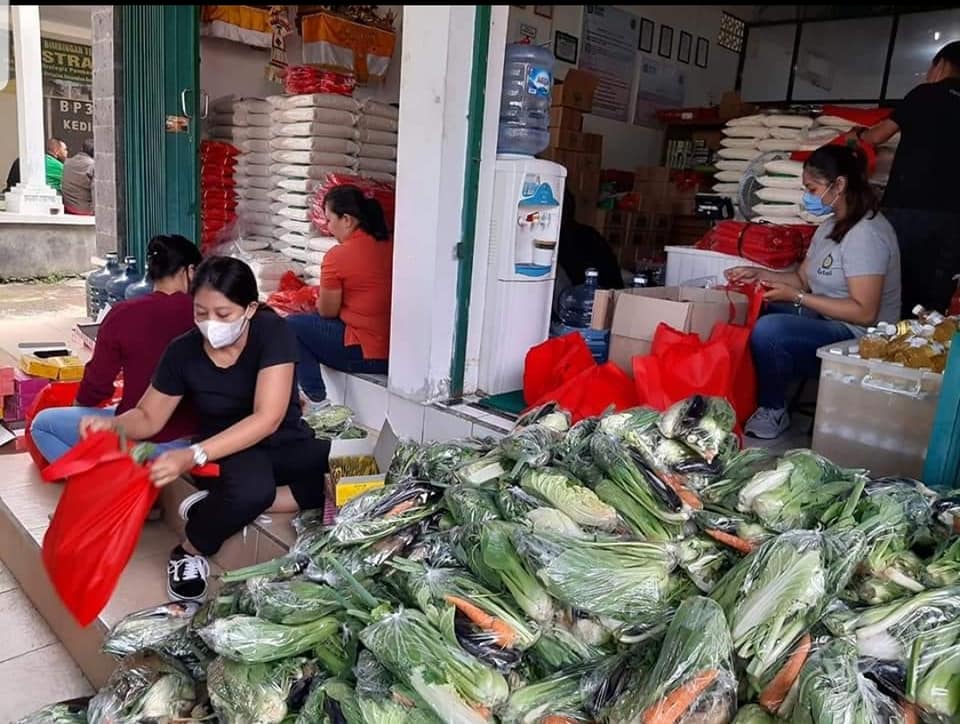 PUD Dharma Santhika involves women in managing local products. Photo: PUD Dharma Santhika
PUD Dharma Santhika involves women in managing local products. Photo: PUD Dharma Santhika
“We really feel the benefits of the RIF program. We have received a lot of training, including barista training. The RIF program has also helped us to obtain distribution permit certificates for coffee, salak, and rice so that they could enter Alfamart, Indomaret and Carrefour.” – I Putu Sugi Darmawan, President Director of PUD Dharma Santhika.
ABOUT THE RESPONSIVE INNOVATION FUND (RIF) PROGRAM
The RIF program is part of the NSLIC/NSELRED project funded by the Government of Canada through Global Affairs Canada (GAC), in collaboration with the Ministry of National Development Planning/Bappenas. The RIF program, which started in 2018, aims to provide technical assistance to selected regions to develop and implement new ideas, methods and practices in order to improve and enhance program planning for the development of public services, businesses and public-private partnerships.
1BUMDES are a program of the Ministry of Village, Development Regions and Transmigration. A BUMDES Bersama is a collaboration involving several BUMDES.
###
No Comment
You can post first response comment.